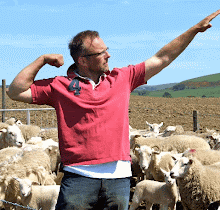Met two first generation dairy farmers yesterday. Both had Equity of between $15 and 20 million having started with minimal savings! Some, if not most, of the successful farmers in New Zealand are first generation and in the dairy industry. Surpluses can be immense one 50:50 share milker (roughly 50% of costs, 50% sharing capital inputs) earned $650,000 last year and this sort of money may see the end of such agreements, as its too much for the land owners to stomach. The flip side is that the previous year little money was made and much lost. Whereas the end price of milk solids (a kg of milk solid effectively means a twelfth of of a litre) used to vary by 50 cents it can now have as much as a $2 fluctuation from year to year. It stands currently at around $7 / kg which is seen as good.
The pathway in dairying seems simple but intrinsic yet only around 20% make it all the way. People start young - late teens, early twenties. Savings are made, this money invested and heifer calves raised. Once milking these heifers can be leased (@15% of value) into other herds and when numbers are large enough a Lower Order share milking job (less capital, less share of surplus than 50:50) can be had putting the cows up as capital. Thereafter a 50:50 share milking opportunity can be sought where rewards can be even greater. Some share milkers run more than one farm; perhaps using a lower order share milkers or employed labour to run the other farms day to day. Apparently there are some in the North Island share milking up to 7 properties. From here land ownership is very realistic given the potential profitability of dairying.
Debt is huge - it is not uncommon for there to be only 30% equity and there are plenty with less. Yet if the return on capital employed is 16% and the interest rate is 8%, yield is still being made on whatever debt is held. Debt is seen as a positive and - in current conditions - easily serviced. The banks might refuse a loan application for $200,000 for a wool shed but accept one from the same party for a $2 million dairy conversion. Yet all that is required is for the price to fall below $5 and there will be a shortage of new under pants in the department stores of New Zealand.
What amazed me was the culture in the dairy industry. Most have had help and kindness bestowed upon them when working their way up the ladder; now those further up, in turn, want to help those lower down. If you are young, driven and want to make a success in farming from a humble starting point - come to New Zealand and milk cows!









No comments:
Post a Comment